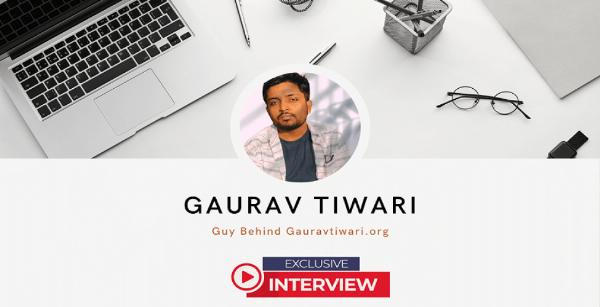Interview with Top Indian Blogger Gaurav Tiwari - Insights, Tips, and Inspiration

Strong 8k brings an ultra-HD IPTV experience to your living room and your pocket.
Gaurav Tiwari a ProBlogger Indian blogger, digital marketer, and designer hailing from India is the mastermind behind the highly acclaimed blog gauravtiwari.org. This exclusive interview series with Gaurav Tiwari aims to delve into his journey and insights about the world of blogging, SEO, web hosting, affiliate marketing, and social media marketing.
Gaurav runs some successful blogs online, including his personal blog gauravtiwari.org, where he shares valuable content covering a wide range of topics such as blogging, search engine optimization (SEO), content marketing, WordPress, web design, e-commerce, and online money-making strategies.
Gaurav Tiwari - Guy Behind Gauravtiwari.org
Gaurav Tiwari has earned a reputation for helpful tips and advice for aspiring bloggers and digital marketers, drawing on his years of experience in the field.
In addition to his blog, Gaurav offers various services like content writing, SEO consultation, and website design, catering to the needs of individuals and businesses looking to improve their online presence.
Apart from his digital marketing and blogging work, Gaurav is also a professional WordPress developer with a mathematics and physics background. This diverse skill set enables him to approach digital marketing from a unique perspective, combining creativity, technical knowledge, and analytical thinking to deliver practical solutions and insights for his audience.
Can you tell us a bit about yourself and your background as a blogger?
I have been involved in blogging, digital marketing, and web design for many years, 15 to be precise.
My background in mathematics and physics has given me a unique perspective on problem-solving and analytics, which I apply to my work from time to time.
Blogging wasn't a planned thing at all. I love writing and that led to me being a blogger.
I started my blogging journey as a way to share my knowledge and personal experiences in these fields (math and physics) during my college days. But within a couple of years of time, I started pivoting and started covering more topics.
My blogs have now grown into a place where I write about almost everything important. I have over a dozen publications right now which I manage with my team at Gatilab. In addition to these, I offer related services to brands and individuals.
What topics do you typically cover on your blog, and why are they important to you?
My blog covers a wide range of topics related to blogging, business, education, marketing and more. These topics are important because they represent the core skills and knowledge required to succeed in the digital world. I aim to help others achieve their goals and unlock their potential in the ever-evolving online landscape by sharing my expertise in these areas.
How do you come up with ideas for new blog posts?
Ideas for new blog posts often come from various sources, including my personal experiences, industry trends, challenges faced by my readers, and popular topics within the digital marketing community. All these actually lead to one single thing though, "keyword research". I use tools like Semrush and SEODITY to search for keywords and their intent before I start writing.
I also listen to feedback from my readers and track the performance of my previous posts to identify what resonates with my audience. This helps me create relevant, engaging, and valuable content for my readers.
How do you balance creating content and promoting it on social media or other channels?
To be honest, I don't care about social media. I use 100% of my time on content creation and optimizing for SEO. I know if my content is performing well in search results, there is nothing else I need to do. I do, however, use social media automation tools like Jetpack Social to automatically share newly published content to social networks.
How do you engage with your readers and build a community around your blog?
Engaging with readers and building a community is vital for any successful blog. I try to respond to every email I receive and every Twitter message I notice. Being approachable fosters a sense of trust and loyalty with my readers.
What advice do you have for someone who is just starting out as a blogger?
This differs from case to case. An educator/education blogger will have to start differently than someone who wants to blog about marketing. But there are some common elements that I'd like to share with you.
For someone starting as a blogger, my advice would be to focus on creating high-quality, valuable content that addresses the needs and challenges of your target audience.
Be consistent in your posting schedule, and learn about SEO and other digital marketing techniques to grow your online presence.
Engage with your readers and build a community around your blog, and don't be afraid to ask for feedback and learn from your mistakes.
Remember that it can take time for your blog to fully become a full-fledged money-making machine. Until then you have to have patience.
If you really want to make money quick, join some affiliate programs and see if they are running any promotional challenges which you can win. For example, the Rank Math WordPress plugin offers a $200 prize for a winning article if you are an affiliate. There are several other such programs that can make you such easy money.
But until you shine, have patience and keep writing. Great content will always make a difference.
How do you measure the success of your blog, and what metrics do you track?
Measuring the success of a blog involves tracking various metrics, such as page views, unique visitors, average time on the page, and bounce rate.
I also monitor social media engagement even, if that is automated, email subscribers, and conversions, such as service sign-ups and affiliate link sales.
By analyzing these metrics, I can identify areas for improvement, measure the effectiveness of my promotional efforts, and better understand the needs and preferences of my audience. Ultimately, the success of my blog is determined by its ability to provide value to my readers and help them achieve their goals in the digital space.
What challenges have you faced as a blogger, and how have you overcome them?
Poor English was the first challenge that I had to overcome. I read books, articles and editorials to build a vocabulary. But that was not it, I had to learn how to write even the most complex ideas into simple words. The thing is that your writing shouldn't look average at first glance and mustn't be complex while reading.
Some other challenges I have faced include maintaining consistency in posting high-quality content, staying up-to-date with industry trends, and managing my time effectively.
To overcome these challenges, I developed a content calendar to plan and schedule everything. I also use productivity tools like Notion, Todoist and Google Calendar to create an ecosystem that helps me do things.
What is your process for researching and fact-checking information for your blog posts?
When researching and fact-checking information for my blog posts, I rely on a combination of reputable sources, such as industry reports, academic studies, and expert opinions. I also cross-reference information from multiple sources to ensure accuracy and verify claims or data points. Finally, I cite my sources within the blog post to give credit and allow readers to explore the topic further if they wish.
How do you stay current with trends and developments in your niche or industry?
I follow relevant newsletters, medium publications, news sources and industry blogs to stay current with trends and developments in my niche.
I also browse online forums and subreddits, attend webinars, conferences, and network with other professionals in my field. These help me stay informed and identify emerging trends or opportunities to incorporate into my blog content.
What strategies do you use to monetize your blog, and how do you balance making money with providing value to your readers?
I use various strategies to monetize my blog, including affiliate marketing, sponsored content, and offering services, such as consulting or web design.
To maintain a balance between making money and providing value to my readers, I ensure that any sponsored content or affiliate promotions are relevant, high-quality, and aligned with my audience's interests. Additionally, I strive to maintain transparency about my partnerships and monetization methods.
You will always see a disclaimer above every article promoting affiliate content.
How do you handle negative comments or feedback on your blog or social media?
When handling negative comments or feedback, I approach the situation with an open mind and a willingness to learn. I acknowledge the commenter's concerns and provide a respectful, constructive response. If the feedback is valid, I take it as an opportunity to improve my content or address any issues. If the comment is offensive or malicious, I maintain a professional tone and focus on fostering a positive environment for my community.
What are your goals for your blog in the next year or two?
In the next year or two, my goals for the blog include growing my audience, expanding the range of topics I cover, and exploring new content formats, such as video or podcasting. I also aim to strengthen my community engagement, develop strategic partnerships, and refine my monetization strategies to support the blog's growth and sustainability.
How do you see the role of blogging evolving in the future, and what opportunities or challenges do you anticipate?
As the digital landscape evolves, I believe blogging will remain a powerful platform for sharing information, ideas, and experiences. However, the role of blogging may shift to incorporate more multimedia content, such as videos, podcasts, and interactive elements.
Opportunities for bloggers may arise from leveraging emerging technologies and platforms, while challenges may include increased competition, adapting to changing user behaviours and maintaining trust and credibility in an increasingly complex information environment.
Note: IndiBlogHub features both user-submitted and editorial content. We do not verify third-party contributions. Read our Disclaimer and Privacy Policyfor details.







